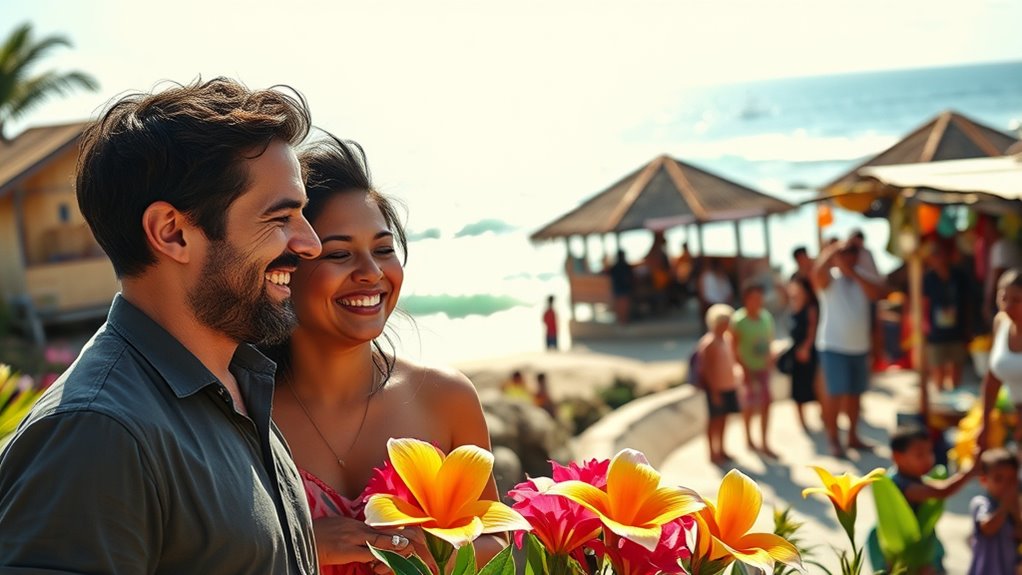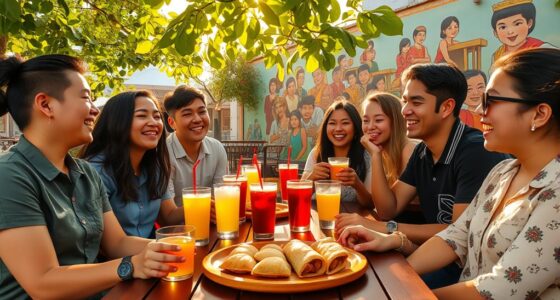Living in the Philippines with your Filipina partner comes with many perks, like a low cost of living, rich cultural diversity, and warm hospitality. You’ll enjoy affordable dining and transportation while experiencing vibrant local traditions. However, urban living may bring challenges like congestion and safety concerns. Understanding the healthcare system and maneuvering potential financial aspects are important too. There’s much more to explore about making the most of your experience in this beautiful country.
Key Takeaways
- Cost of Living: Living expenses in the Philippines are significantly lower than in the UK and USA, enhancing financial comfort and stability.
- Cultural Diversity: The rich cultural tapestry of the Philippines fosters strong community ties and provides opportunities for social engagement with locals.
- Healthcare Access: Both public and private healthcare options are available, but private insurance is recommended for better care and understanding local health benefits is crucial.
- Warm Hospitality: The Filipino culture emphasizes kindness and generosity, creating a welcoming atmosphere for expatriates and their families.
- Urban Challenges: Rapid urbanization can lead to congestion and safety concerns in cities, impacting overall quality of life for residents.
Cost of Living Benefits
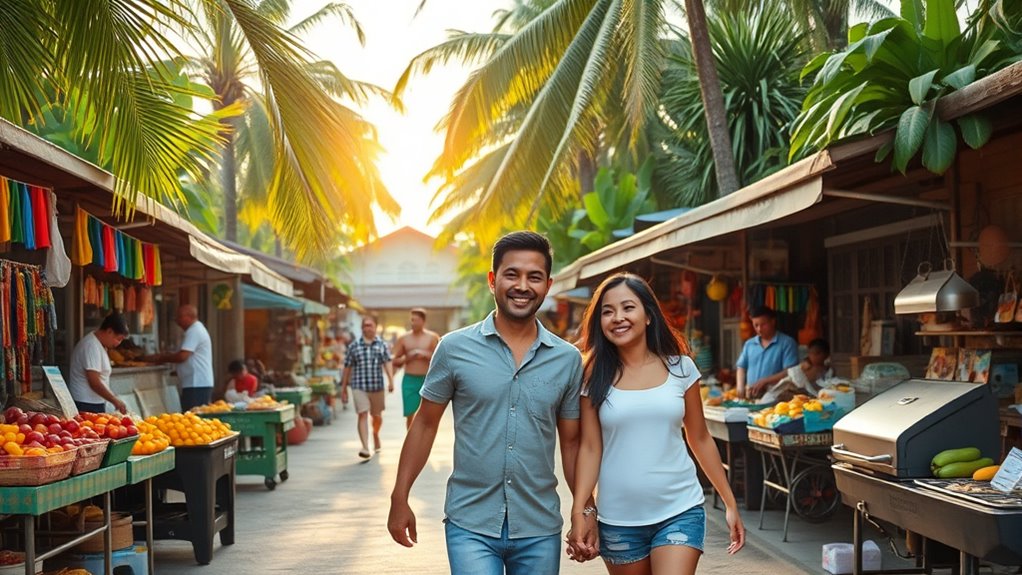
One of the biggest benefits of living in the Philippines with a Filipina partner is the remarkably low cost of living.
You’ll find that overall expenses are about 47.3% lower than in the UK, which makes it an attractive option for expats.
Rental prices are notably cheaper, especially in suburban areas where you can save up to 88% compared to the USA.
Dining out is budget-friendly too, with meals costing as little as $5.
Even groceries won’t break the bank.
Public transport is affordable, and healthcare costs are generally low, making it easier to enjoy life without financial stress.
This economic advantage can provide you with a comfortable lifestyle while exploring the beautiful culture around you. Additionally, the Philippines offers various opportunities for business startup essentials that can help expats establish a sustainable income while living there.
Embracing Cultural Diversity
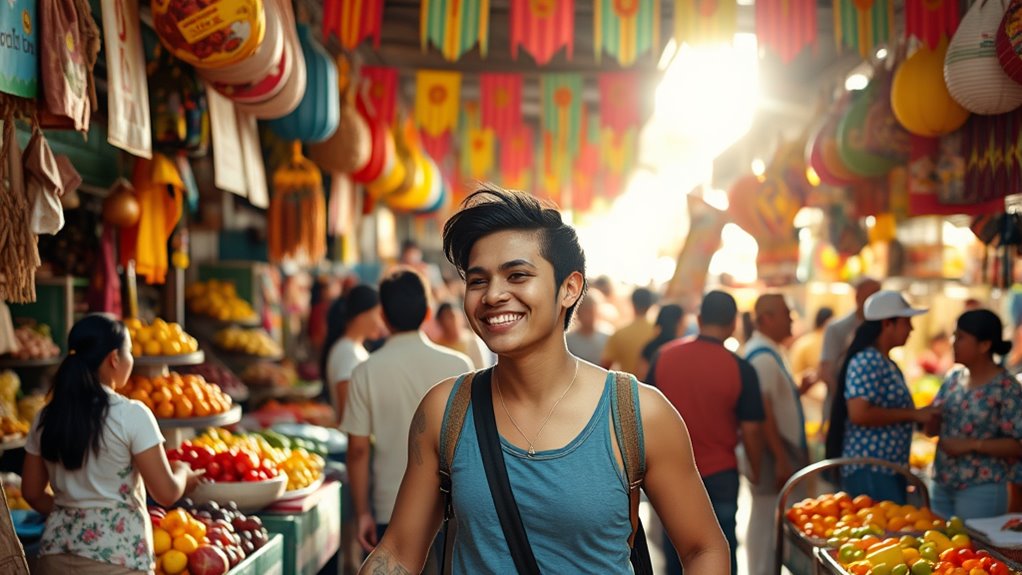
Embracing cultural diversity in the Philippines enriches your experience and deepens your connection with your Filipina partner. The country’s 19 ethnolinguistic groups, including the prominent Tagalog, Bisaya, and Ilocano, offer a rich tapestry of traditions and practices.
By engaging with various languages, such as Cebuano and Hiligaynon, you’ll grasp the unique cultural identities that define communities. Understanding the predominant Catholic faith, along with minority religions like Islam, highlights the importance of respect for differing beliefs.
Participating in local festivals and family-oriented gatherings allows you to appreciate the vibrant food culture and indirect communication style. This immersion fosters a profound appreciation for the Philippines’ cultural diversity, strengthening your bond with your partner and the community.
The Warmth of Filipino Hospitality
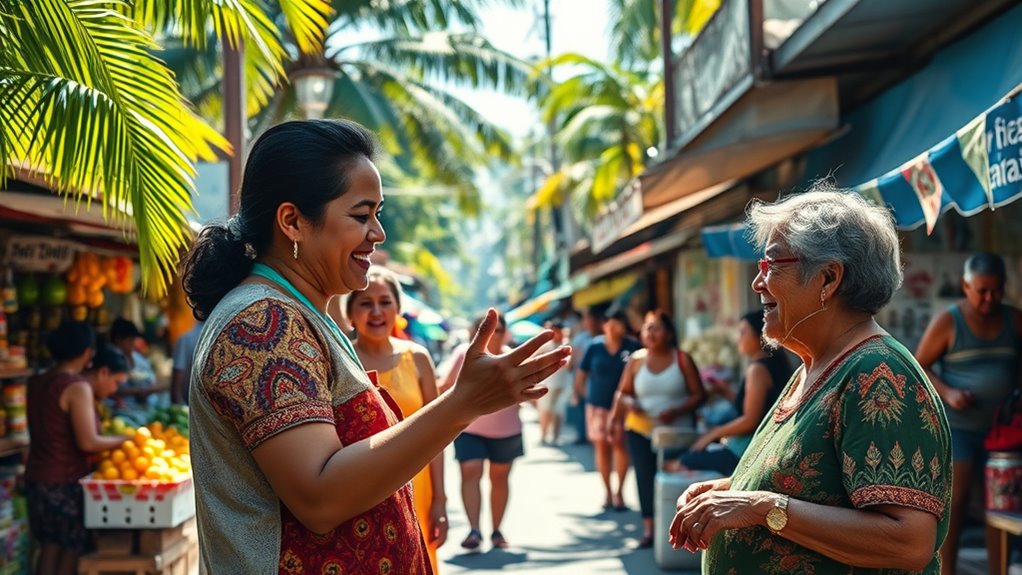
When you step into a Filipino home, you’re immediately enveloped in a warmth that’s hard to find elsewhere.
Filipino hospitality is deeply ingrained in the culture, reflecting kindness and generosity. You’ll often hear warm welcomes like *Tulóy ka/kayó* (“You may come in”), making you feel right at home.
Guests are treated like family, fostering a strong sense of belonging. Sharing food, like lechon or adobo, is a significant part of this hospitality, emphasizing togetherness and comfort.
Guests are embraced as family, with shared meals like lechon and adobo highlighting the spirit of togetherness and warmth.
Filipinos take great pride in their traditions, which have been passed down through generations.
Even in casual interactions, you’ll experience friendly gestures that create lasting bonds. This heartfelt hospitality leaves a lasting impression, making your stay truly memorable.
Navigating Healthcare Services
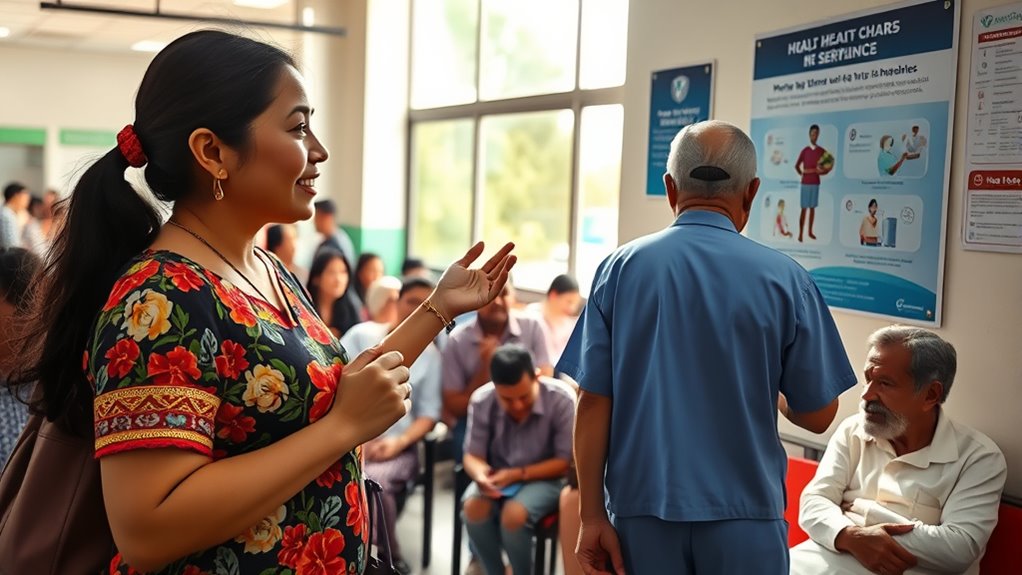
Maneuvering healthcare services in the Philippines can feel overwhelming, especially if you’re not familiar with the system. The mix of public and private options means you’ll have choices, but understanding them is vital.
Public facilities offer basic and preventive care, often at little to no cost, yet they may lack specialized services and face infrastructure challenges. In contrast, private hospitals provide advanced care and better-equipped facilities, making them a popular choice for expats. However, they come with higher costs, so having private health insurance is advisable.
It’s important to learn about PhilHealth benefits and the Universal Health Care Act, which guarantees access to services for all enrolled Filipinos. Communicating in English can ease your navigation through this system.
Appreciating Natural Beauty

As you explore the Philippines, you’ll quickly discover its breathtaking natural beauty, which ranges from stunning beaches to lush tropical rainforests.
With over 7,000 islands, you can relax on pristine beaches or plunge into crystal-clear waters.
Venture into old-growth forests like those in Puerto Princesa Subterranean River National Park, where you’ll encounter rich biodiversity.
The mountainous regions offer scenic hikes and stunning views, while landmarks like Pagsanjan Falls invite you for outdoor adventures.
Don’t miss iconic UNESCO World Heritage Sites like the Rice Terraces and Tubbataha Reefs.
Engaging in activities like island hopping, snorkeling, and cave exploration connects you to the vibrant landscapes, enriching your experience and deepening your appreciation for this beautiful archipelago.
Challenges of Urban Living
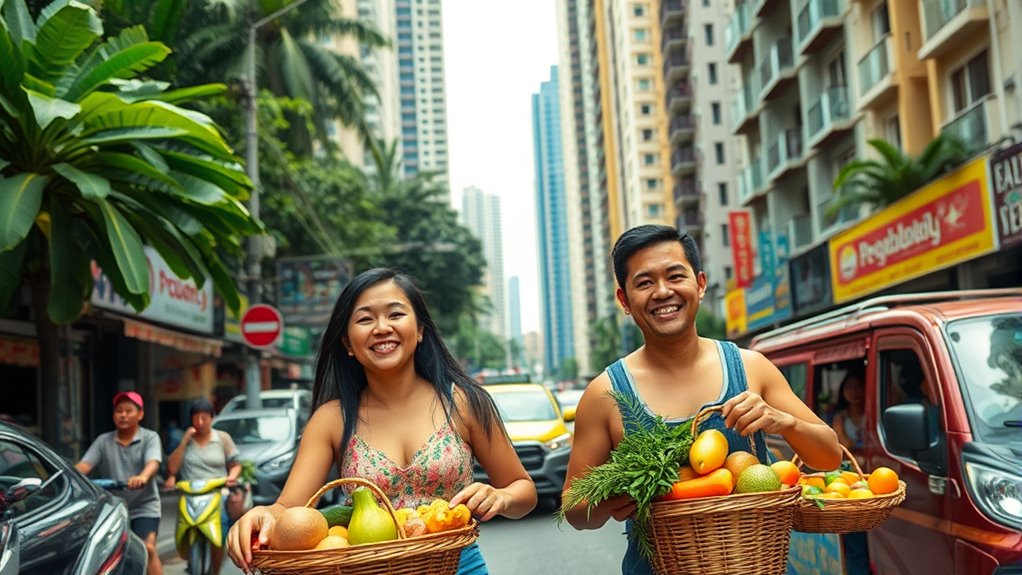
Living in an urban environment in the Philippines can be exhilarating, yet it comes with its share of challenges. Rapid urbanization is leading to increased congestion and overcrowding, making daily life stressful.
Urban life in the Philippines offers excitement but also brings challenges like congestion and overcrowding, adding stress to daily living.
You might experience inadequate infrastructure, including unpaved roads and unreliable services, hindering your ability to navigate the city effectively. Environmental concerns like pollution can impact your health and overall quality of life.
Additionally, socioeconomic issues such as poverty and housing shortages create stark disparities among residents. Safety and crime may also be a concern in densely populated areas.
To thrive in this dynamic setting, you’ll need to adapt and find innovative solutions to navigate these urban challenges effectively.
Importance of Social Integration
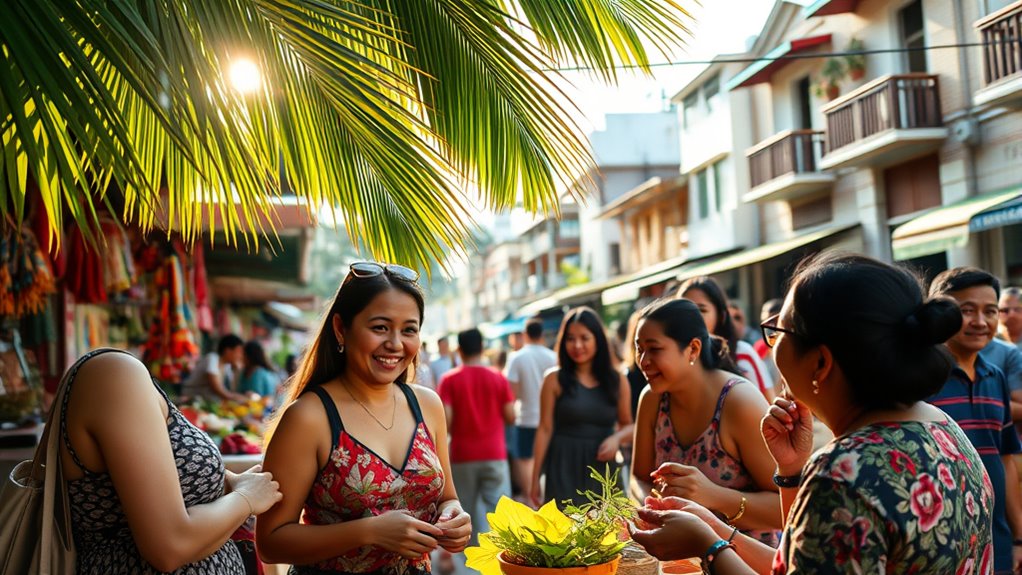
Social integration is essential for anyone looking to thrive in the Philippines, especially if you’re in a relationship with a Filipina partner. Understanding Filipino cultural norms, like valuing family ties and respecting elders, is significant. Politeness and humility will go a long way in building connections.
Engage with local communities by participating in events and festivals; this enhances your cultural understanding and helps you create lasting relationships. Volunteering for local causes not only earns you respect but also deepens your ties.
Recognizing the social hierarchy and adapting to different norms in urban and rural settings is fundamental. Ultimately, embracing the diversity around you fosters a sense of belonging and enriches your experience in the Philippines. By cultivating a lifestyle of kindness, you’re not only enhancing your personal relationships but also contributing positively to the community around you.
Housing Affordability and Options
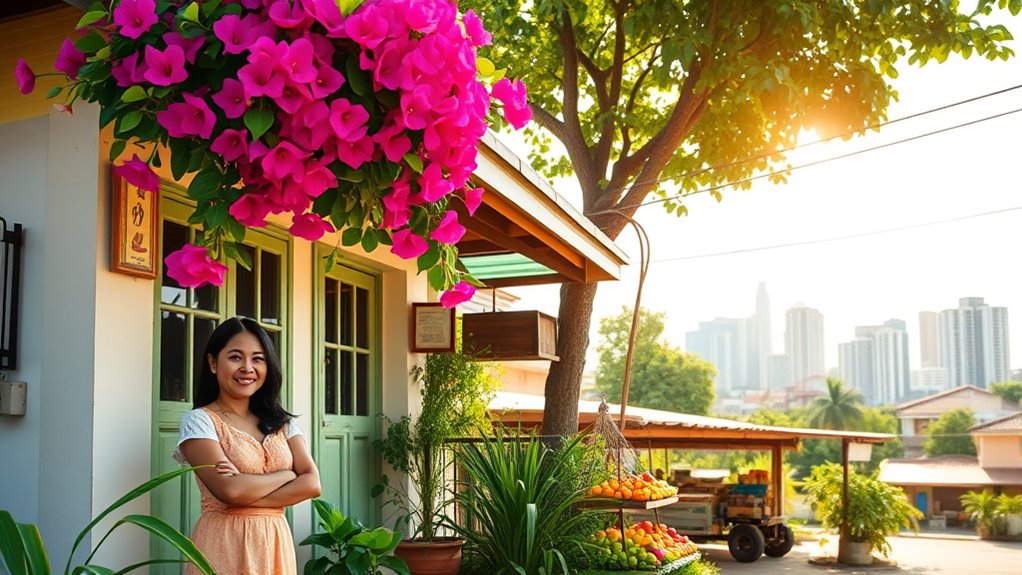
Finding suitable housing in the Philippines can be challenging, especially with the rapid population growth and rising prices in urban areas.
Finding suitable housing in the Philippines is increasingly difficult due to population growth and rising urban prices.
Cities like Metro Manila, Cebu, and Davao face an affordability crisis, where housing costs often exceed the 30% income benchmark for many families.
While you’ll find diverse options—from apartments to luxury condos—affordable choices are often limited, especially in urban centers.
If you’re considering rural areas, keep in mind that they may lack essential services.
Gated communities offer security and amenities that many expats prefer.
Suburban alternatives like Alabang and Tagaytay provide more space and a relaxed environment.
Ultimately, balancing your budget with your housing preferences will be vital in finding the right home.
Economic and Financial Considerations
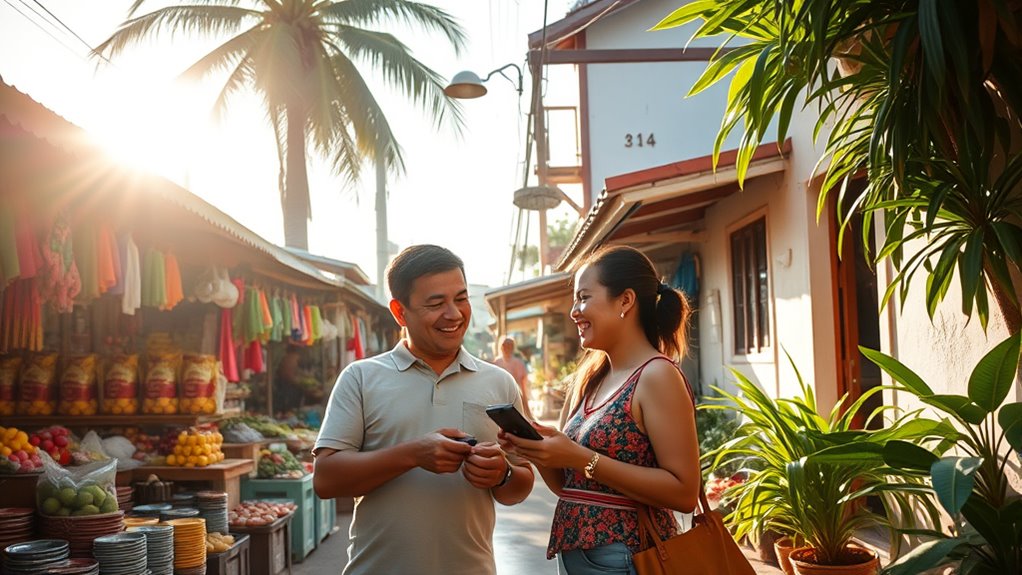
While adapting to life in the Philippines, understanding the economic and financial landscape is crucial for a smooth shift.
You’ll find that the cost of living is considerably lower than in many Western countries, allowing for more manageable daily expenses. However, expenses can vary, especially between urban and rural areas. Required Minimum Distributions can also be a factor to consider if you plan to manage retirement savings while living abroad. It’s essential to establish clear savings goals to ensure financial stability during your time abroad. Additionally, consider implementing risk management strategies to protect your investments while navigating the local economy.
Transportation is affordable, with options like jeepneys and tricycles widely available. Dining out and grocery shopping remain cheap, benefiting your budget.
While many Filipinos struggle with financial planning, those who budget effectively can often save. The local economy is growing, offering employment and entrepreneurial opportunities.
Familiarize yourself with local tax laws and banking options to guarantee you manage your finances effectively and prepare for unexpected expenses. Additionally, consider exploring Gold IRA options as a way to diversify your investments and secure your financial future.
Frequently Asked Questions
How Can I Build a Social Circle in the Philippines?
To build a social circle in the Philippines, start by joining local clubs or community groups that align with your interests.
Attend neighborhood events and cultural workshops to meet locals.
Don’t forget to engage on social media platforms—join Facebook groups or use apps like Meetup.com.
Participating in sports teams or volunteer opportunities also helps foster connections.
What Are the Visa Requirements for Foreigners Living in the Philippines?
If you’re planning to live in the Philippines, you’ll need to understand the visa requirements.
A tourist visa allows stays up to 30 days, while a non-immigrant visa is necessary for longer stays. If you’re married to a Filipino citizen, the 13A Spouse Visa is ideal.
Make sure your passport is valid for at least six months, and prepare necessary documents like financial proof and a completed application form before applying.
How Does the Education System Work for Expatriates?
The education system in the Philippines offers expatriates various options for their children. You can choose between public and private schools, with private institutions often providing international curricula in English.
Bilingual education in Filipino and English helps your kids adjust easily. While public schools are cost-effective, private schools might offer better facilities.
Homeschooling and online schooling are also available, ensuring flexibility for your family’s educational needs.
What Are the Best Places to Live in the Philippines?
You might think living in the Philippines is overwhelming, but it’s actually quite rewarding.
Consider Davao City for its safety and low crime rates, or Makati City for a vibrant urban lifestyle.
If you love culture, Manila’s diverse scene won’t disappoint.
For a blend of city and nature, Cebu City stands out.
And for tranquility, Bacolod’s clean environment offers a lower cost of living.
Each place has unique charms that cater to different lifestyles.
How Do I Handle Emergencies While Living in the Philippines?
When handling emergencies in the Philippines, you should familiarize yourself with the local 911 emergency hotline and keep emergency numbers handy.
Be aware that medical facilities vary in quality, so know where the nearest reliable hospital is. If needed, consider private transport services like Tri-Med for specialized care.
Engage with community programs for emergency preparedness, and if language barriers arise, don’t hesitate to ask for English-speaking assistance to guarantee effective communication.
Conclusion
Living in the Philippines with your Filipina partner is like tending a vibrant garden. With the right care, you’ll enjoy the blossoms of cultural diversity, warm hospitality, and breathtaking landscapes. However, be prepared for the occasional weeds of urban challenges and social integration hurdles. By nurturing your relationship and embracing the local way of life, you’ll cultivate a thriving environment where love grows, and both of you can flourish in this beautiful paradise.
